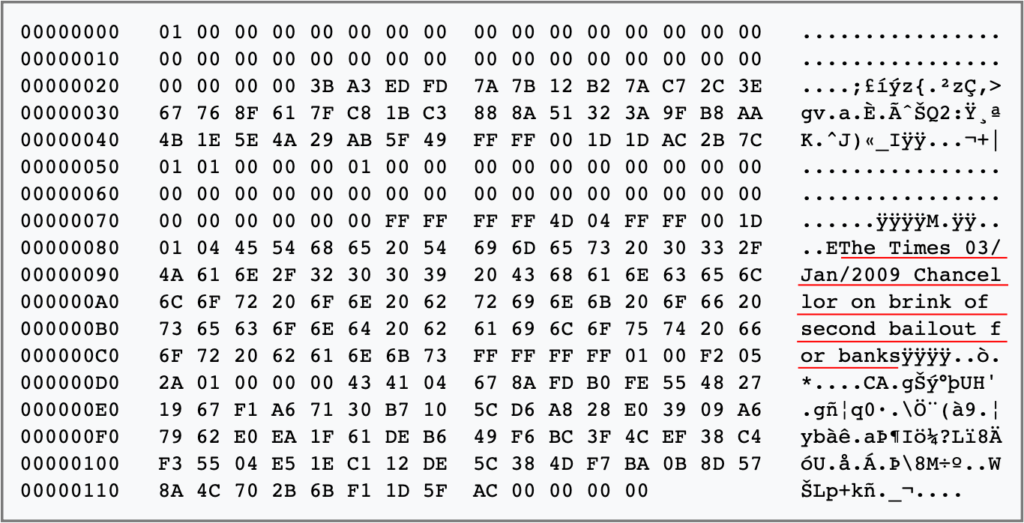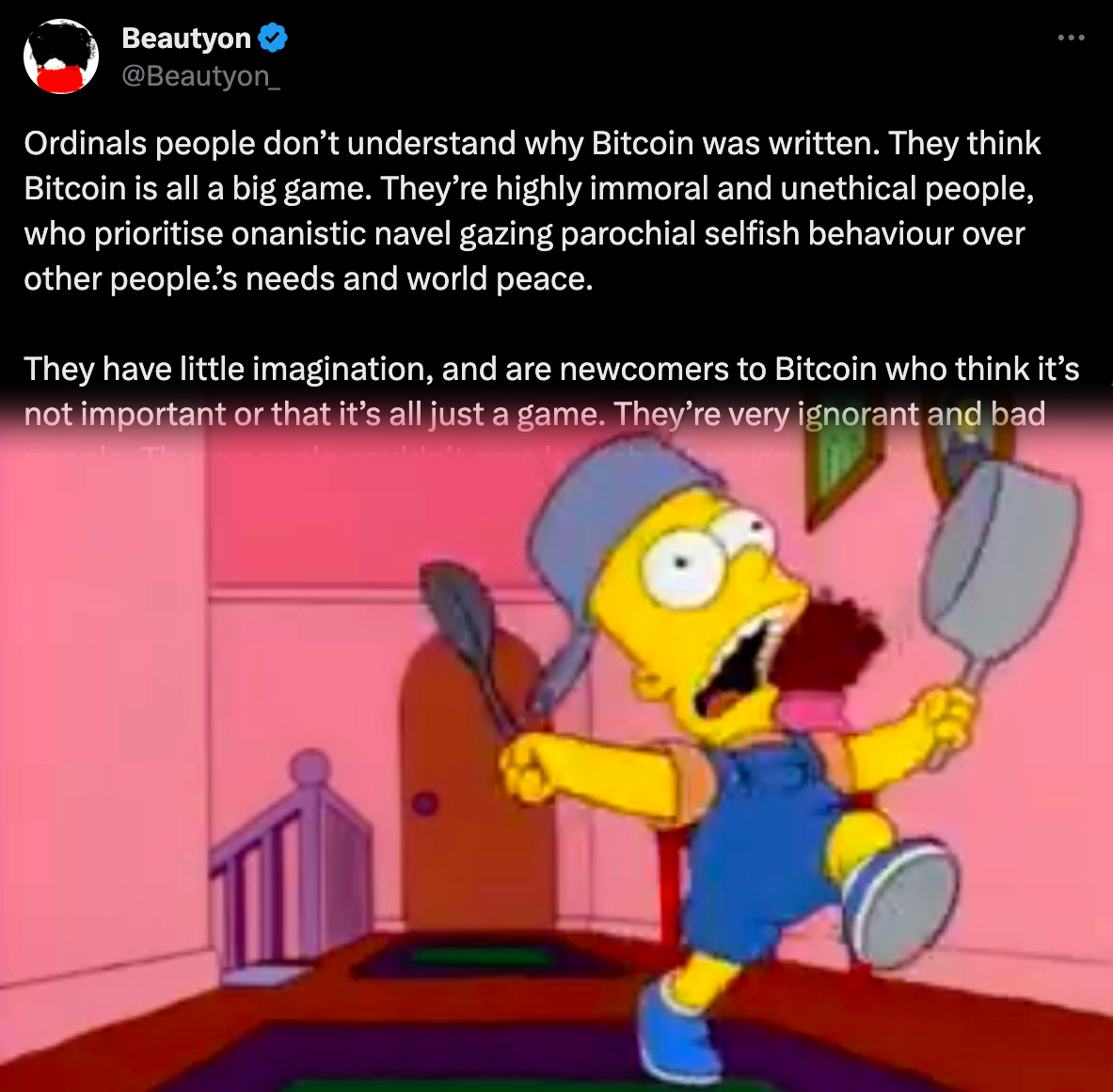The purpose of a system is what it does
What a car in a snowy ditch, a trunk full of shrimp cocktail and a systems theorist can tell us about the future of Bitcoin.
Inside this issue:
What is the purpose of a car?
What is the purpose of Bitcoin?
Those who set the price, set the purpose
What is the purpose of a car?
In our college years, my sister spent a few years living in Fargo (yes, that Fargo) where temperatures drop below -20 F° most winters. Driving back home once during an ice storm her car spun out and into a ditch. The car wasn’t actually all that badly damaged, but it was stuck — so she spent the next few hours on the side of the highway waiting for a tow truck. Since her car’s heater was working, this was mostly just a long, tedious wait — but without it she would have been in serious danger. In many parts of the world a car heater is a luxury comfort, but where I grew up it is legitimately a safety feature.
What is the purpose of a car? Intuitively I think most people would say the purpose of a car is transportation: taking a person (or a small group) from one location to another. But on careful examination that definition is clearly too narrow — people often use cars to travel, but that’s not the only reason they use cars. Sometimes people drive around with nowhere to go because they want to listen to a song or smoke a cigarette or be alone for a bit. Sometimes people drive nowhere in a very tight loop to compete to see who can drive nowhere the fastest. Sometimes they crash cars together for fun. Sometimes people eat in cars and sometimes they sleep in them and sometimes — as my sister did — they use them as shelter from the weather.
Certainly transportation is a purpose for a car, but not necessarily the purpose. My sister’s car was not getting her anywhere — but it was definitely serving a purpose. The reason it is tricky to define the purpose of a car is because cars don’t have a purpose. Purposes belong to people. The purpose of a car is whatever it is doing for the person who is using it.
The purpose of a system is what it does (POSIWID) is a phrase coined by systems theorist Stafford Beer to describe this idea more generally. POSIWID is the idea that what the designers/operators of a system intended for it does not define what it actually does. Users can (and will) superimpose their own purpose and use a system any way they want. Sometimes people use their cars as emergency shelters. Sometimes they fill them with shrimp cocktail.
What is the purpose of Bitcoin?
Satoshi describes the purpose of Bitcoin in the first line of the whitepaper:
Historically, this sentence has been the source of a lot of conflict. The pitch for the failed Bitcoin Cash fork was that Bitcoin was for online payments and hence Bitcoin was meant to be a competitor to cheap payment networks like Visa (it’s not). More sophisticated players understood that in the cypherpunk context the key phrase in Satoshi’s opening sentence was actually electronic cash — i.e. a sovereign digital bearer instrument. Satoshi’s intent for Bitcoin wasn’t to compete with Visa, it was to compete with central banks. The purpose of Bitcoin is to be money.
And yet, just as cars have no intrinsic purpose, neither does Bitcoin — not even the one(s?) that Satoshi designed it for. Satoshi (the author of the whitepaper) intended Bitcoin to be an instrument for monetary transfer, but Satoshi (the first Bitcoin user) immediately used it for political speech. The whitepaper shows one purpose of Bitcoin, but the genesis block shows another.
The purpose of a system is what it does (POSIWID) is a descriptive principle, not a normative one. It describes how a system will behave, not how it should behave.1 I personally find Satoshi’s goals laudable and I share them but that doesn’t mean Bitcoin is predestined to work out how Satoshi intended. Predicting the future of the network is about understanding the intent of Bitcoin users, not its creator.
So what then (in the spirit of POSIWID) does the Bitcoin network do? The intuitive answer is something like "it moves bitcoins" but that’s not really precise enough for the purposes of POSIWID. A slightly more precise description of what the Bitcoin network does is:
Validate that transactions are properly signed and structured
Coordinate a marketplace between miners and transactions for blockspace
Coordinate consensus about which transactions were included in which block
Make it extremely difficult for network history to change / backtrack
Make it extremely difficult for anyone to block access to network history
Make it extremely difficult for anyone to censor new transactions
Viewed this way, Bitcoin is a universally accessible, highly uncensorable, ordered ledger where the records are sorted by auction and stored forever. Records on the Bitcoin ledger are required to have a specific structure because Satoshi intended for people to treat their outputs as money, but that interpretation isn’t actually intrinsic to the network rules — a bit like how paper currency is intended to be money but can also be used as a literal piece of paper instead.
Bitcoin is designed to support monetary transactions but it allows any valid transaction and it has no way of validating user intent. Lots of Bitcoin users have elected to create (or interpret) transactions in other ways.
Some people use Bitcoin’s sequential ordering as a timestamping service. Others use Bitcoin’s censorship resistance to embed politically volatile information like the Wikileaks cablegate data or the events of Tiananmen Square.2 And some people use the permanence of Bitcoin’s ledger to store data they think is culturally or historically significant like the Bitcoin whitepaper or the lyrics to Rick Astley’s "Never Gonna Give You Up." It seems unlikely that storing an eternal rickroll was the purpose that Satoshi had in mind in the whitepaper — but it is what Bitcoin does.
These competing cross-purposes are why there are so many awkward and conflicting metaphors about Bitcoin: a payment network, digital gold, a shared database, an economic battery, a time-stamping server, etc, etc. These metaphors are incomplete because they don’t describe Bitcoin, they describe the goals that people have when they use Bitcoin. How Bitcoin is used is decided by who gets to use it, and who gets to use Bitcoin is decided by their willingness to pay. For anyone outbid by a competing use case, that can feel like a betrayal of purpose.
Those who set the price, set the purpose
Bitcoin has many unique properties: finite supply, universal access, permanent history, consensus ordering. Generally most people think of the 21M limit as the purpose of Bitcoin and the other aspects being valuable mainly because they help achieve and defend the finite supply. But the market could certainly decide it’s the other way around: the finite supply is useful mainly because it enables the first credibly neutral, universally accessible record of world history. Maybe the point of Bitcoin is to store rickroll lyrics?3
Or perhaps Bitcoin’s most important quality is how quickly it reaches finality and how difficult it is to alter transactions once confirmed. Maybe the purpose of Bitcoin is to operate a distributed no-take-backs machine that lets users record messages to the ledger that can’t be retracted. Maybe the most valuable use of Bitcoin isn’t to be a bedrock reserve currency but instead to be high-value, high-speed collateral that can reach finality much faster than US Treasuries or gold bars. People using Bitcoin’s scarcity as a long term store of value may find themselves priced out by people using its speed as a tool for rapid settlement.
Or perhaps Bitcoin’s most important quality is that it is expensive to use? Maybe blockspace will turn out to be a Veblen good and the most valuable way to use it will be to impress other people that you can afford to use it at all. Perhaps the most valuable purpose of Bitcoin’s blockchain is to be a distributed vanity billboard where people buy up space just to prove they can. People using Bitcoin as a system for trading may be rich but presumably still price sensitive. They may find themselves priced out by people for whom rising costs is a feature not a bug.
None of the worlds that I’m hinting at here are the one that Satoshi was designing for and there is no guarantee that the game-theory of Bitcoin is stable under those conditions. It is entirely possible that Bitcoin will fail not because it doesn’t work as money, but because it works too well at something else.
Othering things happening right now:
A 13 year old from Oklahoma has become the first human to ever beat Tetris, by playing until the game crashes. You can watch his reaction to winning here.
Microstrategy acquired another 14,620 BTC for ~$615.7 million (~$42k/btc). They now hold a total of 189,150 BTC acquired for ~$5.9B (~$31k/btc). Microstrategy now holds ~0.9% of the currently available supply of bitcoin.
The price of Bitcoin dropped ~11% on Wednesday but less than <1% of all bitcoin moved in response. The number of times the average bitcoin has moved in the last year is the lowest it has been since 2011. The price of Bitcoin is up ~164% over the last year but investors don’t seem to be in any hurry to cash in yet.
c.f. Hume’s Guillotine
As I am writing this someone is actively inscribing the Afghan War logs onto Bitcoin.
I’m being hyperbolic, don’t @ me.







